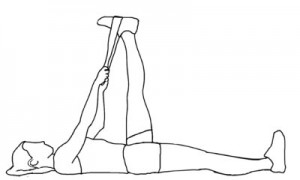We see people every week in the clinic with a ‘pulled’ hamstring or ‘tightness’ in their hamstring. It is a common injury that can be prevented in most cases. The hamstring (at the back of the thigh) is made up of 3 parts- semimembranosus, semitendinosus and biceps femoris, and collectively their main function is to pull your knee back (as in kicking your bottom), and too extend your hip backwards.
Most hamstring injuries are due to the muscle being loaded too much too soon. This means the hamstring is being asked to work harder than it has the capacity to do so. This can result in a tear in the muscle. An example of this, would be someone who has a desk job, sitting most of the day, and decides to ‘get fit’ so starts running at weekends pushing themself as much as they can. Now, although this is good for your cardiovascular fitness, this is a shock to the body, and if the muscle is unable to cope with this sudden increased demand on it, it may result in a tear in the muscle or a tendon injury.
Another common method of hamstring injury is a sudden pain (and potentially a ‘pop’ feeling) that can occur during a fast over-stretching motion such as sprinting or kicking or sudden deceleration of running. Hamstring tears (or strains) can be graded 1-3, and with a thorough assessment by your Physiotherapist, this can be determined which will help to get a timeline on how long your rehabilitation will take.
If you have pain in your hamstring that is persisting or you suspect a strain, get an assessment with a Physiotherapist to ensure you receive the correct treatment. Don’t let it drag on and become a ‘niggly pain’-the sooner it is treated, the faster the recovery!
Even better…try to avoid getting hamstring injuries in the first place! Here are some tips: (Source Therapeutic Heat)
- Don’t overload your hamstring too much too soon: do a gradual approach to any new exercise or change in routine. Follow the 10% rule-don’t increase your training more than 10% per week (in terms or weight/distance/speed).
- Maintain sufficient flexibility: hamstring stretching such as the one below is a simple stretch to improve hamstring flexibility. This should be held for 30secs-1min x 3 times, and done 3/week.
- Warm up properly: a good warm up can help prepare your muscle for exercise. Dynamic exercises such as lunges, squats, or a light walk/jog for 5-10mins before intense exercise can help warm up the muscle.
- Strengthening: When the hamstring is strong, it should be more resistant to injury. The Nordic Hamstring Curl is an excellent exercise with good evidence demonstrating that is prevents hamstring strains.
Hamstring stretch using a band/towel/belt.
Nordic Hamstring Curl:
If you would like to be assessed and treated by a Chartered Physiotherapist, call 086 3582911. Anne 🙂

